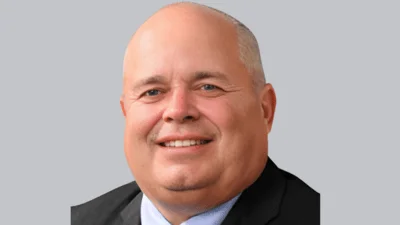William “Bill” Fawell, the Galena Republican vying the seat held by U.S. Rep. Cheri Bustos (D-IL) in the 17th Congressional District, delivered his take on liberty and domestic policy via a recent YouTube video that focuses on solving the problems he says are plaguing democracy today.
“This … is to jump-start a healing process to mend our divided nation through the decentralization of our federal government and its effect upon domestic policy,” he begins by way of introduction.
Our government allocates close to 25 percent of its gross domestic product (GDP) to Wall Street, said Fawell, who estimates that an amount totaling $5 trillion goes to health care and military costs, the Federal Reserve Bank, national security and federal agencies – all of which “funnel wealth towards Wall Street.”

Running on a platform of systemic change, Fawell conveys his perspective and with regard for history’s place in the present as he describes America’s current economic status in the video.
“We have passed the Rubicon of bankruptcy in America as the fourth most indebted nation in the world,” he said in the video “Our government has become addicted to debt and we have passed the point of no return.”
He said the balance of power in our federal system has, in his view, long been out of whack, taking a toll on constituents.
“Did you know that history defines a revolution as a governmental bankruptcy?” he said. “It’s true."
Fawell points out that corruption has evolved from our very model of government, which he said “allows 90 percent of our laws to be written by an executive branch agency that never sees the light of day in our Congress.”
Hence, he suggested, laws can be virtually obtained by private interest groups.
“This is how lobbyists and corporations acquire the best laws money can buy, destroying America by living beyond our means,” Fawell, a DuPage County native, said in the video. Stating that stocks, health care and housing, savings, jobs and pension funds fall victim to this structure, Fawell posited that economic growth is but an illusion; he blames the Federal Reserve Bank’s “experimental” monetary policies and its misleading “mirage of the wealth effect.”
“We have become two nations economically,” he said. “We might not see it, but we all feel it, regardless of which side of the tracks we fall on. We all know the corruption of our government is the problem.”
He said only two ways exist to handle bankruptcy conventionally – liquidation or reorganization – and proposed a reorganization of the Constitution.
This can be achieved through organized decentralization, he said. By blocking the wealthy ruling elite factions’ ability to control the government, America can restore the Constitution; redefine the states’ roles; and overcome “decades of transgressions against our Constitution.”
He compares the country’s current status to its condition back in 1776 – only “instead of monarchs, lords and ladies, we have oligarchs and technocrats. We the people must not only reclaim our Congress, but we must reclaim its powers through decentralization.”
Fawell wants to see lawmaking return to the people via the public forum of legislatures – even if that means abolishing some agencies or reassigning them back to individual states. He reflected on the respective roles of three types of federal agencies: law enforcement; independent and private agencies and public agencies.
He said law enforcement, including Justice, the FBI, Homeland Security, NSA, CIA, etc., relies entirely too much on the executive domain, for starters.
Regarding independent and private agencies, Fawell believes that the Federal Reserve Bank allocates money to Wall Street that belongs in a free market.
Regarding government agencies, Fawell relates how the FDA drives up drug prices by enabling commercial monopolies. Then there’s the FCC, a five-member unelected board of former lobbyists that “decided the fate of the internet for 300 million Americans” while a 535-member Congress stands by, he said.
Additionally, Fawell said the SEC never indicted any of its own for the 2008 banking crash; nor has the CFTC ruled against any commodity trader for the past 20 years.
“What’s the purpose of a Constitution if we’re going to ignore it?” he asked.
As for public agencies, Fawell said the EPA, HHS and DOE interfere with their corresponding state-level agencies. The 10th Amendment speaks to the restoration of power to the states, “creating the intended and unimaginable consequence of freedom,” Fawell said. “Isn’t this exactly what we’re after? These powers belong to the states … and they already have the agencies in place to take on the responsibilities.”
Fawell left few stones unturned in his summary, citing mines mismanaged by EPA to potential conflicts of interest in agriculture.
Reflecting on our nation’s birth, he cited George Washington’s farewell address of Sept. 17, 1796; updating our first President’s warning that centralized power could land in the hands of “cunning, ambitious, and unprincipled men.”
“Who will solve the problem faster: one omnipotent agency … or 50 states competing … to do a better job?” Fawell said. “It’s a rhetorical question if I ever heard one.”
Regardless of its complex guises, the problem boils down to everyday “systemic corruption” in the government’s operation, he said.
“(Our) U.S. Constitution is designed to protect … American people from the natural abuse of government power,” he said, stressing that power can attract the wrong kind of people. To clarify, he pointed out that the Constitution is not a living document, but rather it is as if it were etched in stone. Those who wish to portray it as living, he said, are the same “cunning and ambitious” politicians who wish to abolish it.
“What is called for is a complete review of our federal government and its agencies," he said. "You have to ask yourself why America needs 17 intelligence agencies to protect us. The answer is we don’t.”
In Fawell’s opinion, it’s not a question of whether these predictions will come to pass, but rather, when.
“In truth, at least a dozen security agencies need to be terminated and total surveillance on Americans must end,” he insisted, starting with the termination of FISA, the Foreign Intelligence Security Act of 1978. Fawell believes that the Espionage Act of 1917 actually provides all the security that the nation could possibly need against a foreign entry. Citing section 702 of FISA, he claims that that latter law is utterly unnecessary.
“I think that is a view that would be shared by every member of our 1776 revolution,” he said. “Each time we make an exception to the powers of our Congress we weaken all the protections of our Constitution. Again, this is why our Constitution is not a living document, but one that is written in stone.
“We live in unusual times,” he said. “The decisions we make today will determine where America will be tomorrow. … I’m the only candidate in this race from either party who (can understand) and will share with you the core issues and problems that America must address. … I can also share with you solutions.”
Fawell distanced himself from the stereotypical politician’s promises of deal-making or magical job creation through one government program or another. Instead, he expressed his desire to see every American pursue their dream, whether to start their own business or find work that promises affordable health care – free from corruption.
“This is the best service any candidate can perform for the citizens of the district they represent, and this is what makes me the best choice for a congressperson to represent you in D.C.,” he said.
In closing, Fawell urged constituents to “Live the dream: take America back.” He encouraged listeners to share his perspective in the community, suggesting “If you share this vision of a greater America in our Constitution … I would invite you to share your thoughts with your friends; lend me your support come Election Day on March 20 and Nov. 6, 2018. Invest your vote with me. I won’t let you down.”
The 17th Congressional District includes much of the state’s northwestern region, stretching from Galena to Rockford to Rock Island and Pekin.






 Alerts Sign-up
Alerts Sign-up